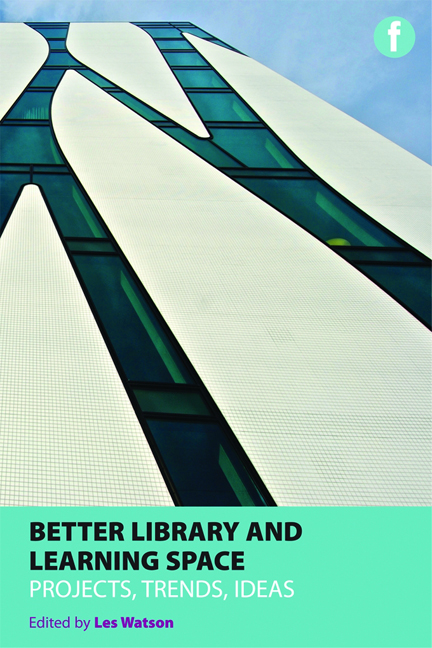Book contents
- Frontmatter
- Contents
- Case studies
- Acknowledgements
- Contributors
- Introduction – about this book
- PART 1 PROJECTS AND TRENDS
- PART 2 TRENDS AND IDEAS
- PART 3 IDEAS AND FUTURES
- Introduction
- 11 Beyond space: access is all – or is it?
- 12 Thinking inside the box
- 13 Nothing has changed/everything has changed – the enduring aspects of learning
- 14 Books, nooks and MOOCs
- 15 The researcher's view: context is critical
- 16 Libraries in the network society: evolution, revolution, extinction?
- 17 Powered by learning: developing models of provision to meet the expectations of new generations of students
- 18 The library has left the building
- 19 Beyond analogue: the learning studio as media-age library
- 20 3D libraries for 3D smarting
- 21 Learning landscapes, the library and the University of Lincoln: efficiency, effectiveness, expression and experimentation
- 22 Viral design: learners building better environments together
- 23 The interior designer's view
- 24 Furniture fit for the future – a brief exploration of library and learning furniture today and for the coming generation
- 25 Conclusions
- Index
17 - Powered by learning: developing models of provision to meet the expectations of new generations of students
from PART 3 - IDEAS AND FUTURES
Published online by Cambridge University Press: 08 June 2018
- Frontmatter
- Contents
- Case studies
- Acknowledgements
- Contributors
- Introduction – about this book
- PART 1 PROJECTS AND TRENDS
- PART 2 TRENDS AND IDEAS
- PART 3 IDEAS AND FUTURES
- Introduction
- 11 Beyond space: access is all – or is it?
- 12 Thinking inside the box
- 13 Nothing has changed/everything has changed – the enduring aspects of learning
- 14 Books, nooks and MOOCs
- 15 The researcher's view: context is critical
- 16 Libraries in the network society: evolution, revolution, extinction?
- 17 Powered by learning: developing models of provision to meet the expectations of new generations of students
- 18 The library has left the building
- 19 Beyond analogue: the learning studio as media-age library
- 20 3D libraries for 3D smarting
- 21 Learning landscapes, the library and the University of Lincoln: efficiency, effectiveness, expression and experimentation
- 22 Viral design: learners building better environments together
- 23 The interior designer's view
- 24 Furniture fit for the future – a brief exploration of library and learning furniture today and for the coming generation
- 25 Conclusions
- Index
Summary
Libraries at the heart of campus life
At a time when discussions about academic libraries attract headlines about the impact of electronic publishing (Harris, 2012; Reisz, 2012, reporting on a round-table discussion held in April 2012), and the financial cuts resulting from the UK Coalition Government's new funding regime for English universities, it is easy to overlook the library's role at the heart of the campus.
This role has been evolving steadily. Building on their established strength of placing students at the centre of their work, libraries have embraced a range of services which go well beyond printed collections: audiovisual materials in the 1960s and 1970s, computing in the 1980s, educational development in the 1990s, and, most recently, one-stop shops which provide a single point of contact with a range of student support services.
Libraries are well placed to help universities tackle the challenges that lie ahead. As institutions seek new ways of working to deal with reductions in funding and to meet the increasing expectations of students who are paying (in England at least) substantial fees, services are being reorganized to make them more accessible and to drive down costs. This integration or ‘superconvergence’ of services has generally been led by librarians, who use campus library buildings as the focus for activities.
The move to integrate services affects all aspects of provision, including staff roles, organizational structures and the design of space. Integration can also create the right conditions for educational innovation, encouraging staff to work together on course developments and allowing specialists to share their skills to offer high quality support to students.
A key issue here is the social dimension of learning. The future of libraries will continue to be shaped by interactions between students, and with staff, building on their established roles and culture and also new ways of working together.
Integrated services are also being developed in other settings used by students. Public libraries are collaborating with universities and colleges, as well as arts and heritage organizations, to develop a wide range of facilities that place them at the heart of their communities. Learning centres, which bring together help, resources, innovative space and support for study, are being developed to provide a focus for learning in organizations of all kinds. Shared space is the key ingredient which attracts learners and will shape the development of services for the future.
- Type
- Chapter
- Information
- Better Library and Learning SpaceProjects, trends and ideas, pp. 201 - 208Publisher: FacetPrint publication year: 2013



